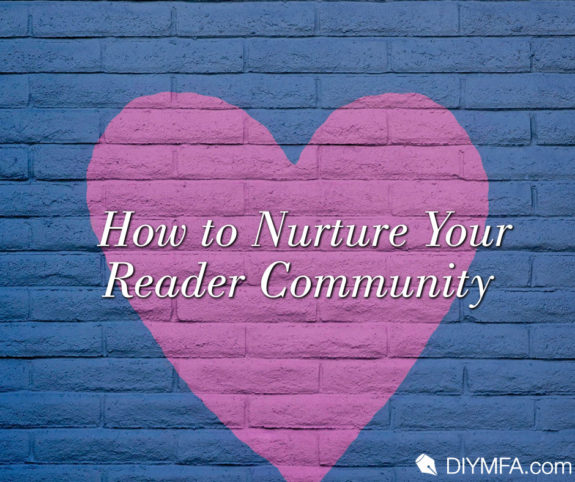Happy New Year, writers! Over the past few months, I’ve spent a lot of time talking about ways to build and grow an author brand–primarily focusing on you (your website, your social media presence, ways to make sure you’re being as authentic as possible, etc.)–but today I want to talk about an aspect of your brand that is often overlooked: your reader community.
Ideally, your reader community is a group of people who absolutely adore your work–readers who will buy every book you write, leave glowing reviews, interact with you and other fans online and, perhaps most importantly, tell the world about how awesome your books are. A snazzy website, social media presence, and an author newsletter can do wonders. They attract a community of loyal readers, but you also have to make sure you’re putting in the work to develop and maintain those relationships with a nurtured reader community.
Read on for some tips on attracting (and keeping!) fans and nurturing a community of loyal readers.
1. Write Good Books
This is probably a no-brainer, but it is so, so important. Although what constitutes a good book can be somewhat subjective (for example, I’m not a fan of every book that graces the New York Times Best Seller list), I think we can all generally agree that, as readers, it’s much easier to fangirl over a well-written book than a mediocre one.
So how do you write a good book? I won’t speak to specific genres in this article, as that’s up to you to research and practice on your own, however, I will say that a well-written book generally has the following qualities:
- It’s edited and proofread. No one wants to read a typo-riddled book. It’s confusing and frustrating and, ultimately, just no fun to read. Before hitting “publish” or sending your manuscript off to agents, it’s important that you’ve carefully edited and proofread it (or hired a professional to do so for you).
- It meets reader expectations. This one’s a bit more complicated, as reader expectations vary by genre. Make sure you’re reading extensively in whatever genre you’ve chosen to write in and keep an eye out for what works and what doesn’t. It can also be helpful to take a peek at what reviewers are saying about books within your genre–what does your reader community love about a book? What don’t they love?
2. Remember: It’s Not Always About You
Yes, it can be tempting to constantly advertise your book all over social media and your website. After all, you worked hard on your book and it deserves every chance in the world to succeed–you just need to get it into as many reader hands as possible. You might be fighting the urge to send out yet another email blast about your latest release. You might even feel the need to constantly message your fans and maybe even complete strangers about buying your latest book or signing up for your newsletter. Resist those urges!
As a general rule of thumb, too-frequent and too-aggressive advertising is the quickest way to drive readers away from you rather than toward you, and that’s definitely not something you want. Instead of subscribing to the scammy sales technique of attracting more readers, try providing something of value (besides your book). For example, what might readers take away from following you on social media, or signing up for your newsletter? Here are some ideas:
- Share book-themed recipes. If you love cooking, share a recipe that relates to your book in some way. Does your main character love a specific kind of martini? Share that recipe? Does your book partially take place in a bakery? Share a recipe for chocolate chip cookies. Okay, now I’m just making myself hungry…
- Share book recommendations. Can you think of any books that your readers might love to read after they’ve finished reading yours? Make a list! For example, if you write cozy mysteries, you might want to make a “Top 10” list of your all-time favorite cozy mysteries. Not only does this provide value to your readers, but it’s also a great way to support other authors like yourself.
- Share writing tips. I personally love reading about other authors’ writing routines and advice. If you have any tips for budding writers in your genres, share them in a blog post or in your next newsletter. If you feel comfortable with it, you can also do a “desk tour.” What do you keep at your writing desk? Or do you write somewhere else (your patio, kitchen table, etc.?). Share it with your readers!
3. Interact With Your Fans
This can be a bit tricky, especially if you’re shy like me, but interacting with your fans is key to making sure you hold on to them as you grow and write more books.
When I say “interact with your fans,” I’m not saying that you need to be BFFs with every single one of your readers. As a matter of fact, I’m a huge advocate for setting boundaries. After all, you’re a human being with a life outside your creative work. That being said, you never want to make your readers feel unappreciated, or like you’re just using them to get more sales or publicity.
Here are some ways you can interact with your readers (while also maintaining healthy boundaries):
- Share reader-made fanart. If you’re fortunate to have a few artistically inclined readers who love drawing fanart of your main characters, setting, etc., then consider sharing some of those on social media or in your newsletter.
- Conduct polls. If you have the means to do so, it can be a lot of fun to have readers vote on cover art for your next book. If that isn’t up your alley, you can also have readers vote on character names, settings, and more. Not only can this help you make some executive decisions regarding your work, it also gives your readers a voice, and ensures that they feel like a part of a community.
- Create an ARC team. If you’re looking to build an ARC team, consider inviting some of your readers to join. It’s a great way for you to get feedback and glowing reviews on your latest release, and it benefits your readers, as they get free copies of your books. It’s a win-win!
4. Never Take Your Community For Granted
Last but not least, it’s important that you never take your reader community for granted. Treat your fans with the kindness and respect that you expect from them, and you’ll have loyal fans for life.
Here are some brief tips for ensuring that your community (whether that be on social media, in your newsletter, or on your website) is a positive and safe place for both you and your fans:
- Avoid drama and negativity. Never, ever badmouth a fellow author or a reader. It’s a terrible look and one of the quickest ways to turn readers away from your brand. Typically, you’ll want to remain positive and upbeat, however, some authors are comfortable sharing their trials and tribulations with their readers (which is fine!). Whatever you decide to do, make sure you’re consistent and, again, make sure you set boundaries.
- Express gratitude. Make sure your readers know that you’re grateful for them! You can do this by posting a quick thank you note on your social media or, if you’re feeling extra grateful, maybe giving away some freebies to your newsletter subscribers (a deleted chapter, perhaps, or the first chapter of your newest book).

Manuela Williams lives and writes in Nevada. She is the author of two poetry chapbooks and one paranormal fiction novella. When she’s not writing, Manuela loves reading romance novels, drinking *all* the coffee, and playing video games.







